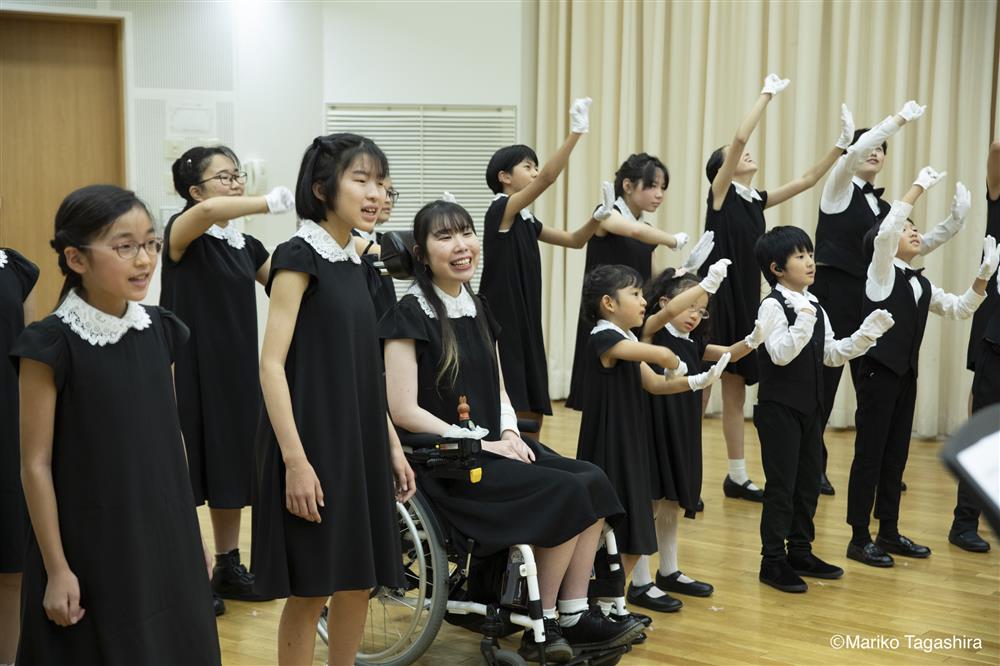A replicable model of an inclusive youth choir making music incorporating sign language
- Solution
- The White Hands Chorus NIPPON
- Country of Implementation
- Japan
- Start Year
- 2017
- First published
- 03.12.2023

Solution details
“Music has to be recognized as an agent of social development in the highest sense, because it transmits the highest values – solidarity, harmony, mutual compassion.” José Antonio Abreu, Founder of El Sistema in Venezuela
The White Hands Chorus Nippon (WHCN) is a music programme run by El Sistema Connect, an NGO based in Japan. It is an inclusive music choir that consists of deaf children, children with visual and intellectual disabilities, as well as children without disabilities. The choir, supported by the Tokyo Metropolitan Theatre, combines a singing group and a gestural group that perform together and express themselves in sign language. WHCN offers free weekly lessons, organizes professional performances across Japan, and has grown from 35 members in 2017 to 98 members in 2023.
Problems Targeted
The Japanese education system lacks adequate inclusive environments for children with and without disabilities.
Solution, Innovation and Impact
The White Hands Chorus NIPPON (WHCN) is an inclusive youth choir with members aged 6 to 20 years, half of whom with disabilities, representing unity in diversity. Inspired by the White Hands Chorus (Coro de Manos Blancas) founded in Venezuela in 1995, the choir consists of a singing group and a gestural group that perform using sign language. The singing group includes members with vision impairment, those who use wheelchairs, individuals with Down syndrome, and others without disabilities. In the gestural group, deaf members express the lyrics through sign language while wearing white gloves. Free workshops and lessons open the door for children in vulnerable situations. The WHCN provides a stage for choir members to unite, regardless of their conditions or disabilities, showcasing their talents and promoting acceptance. Certified teachers, including professional artists with disabilities, actively participate in WHCN’s practices and offer management advice. Online lessons are also available. The WHCN was the first group with deaf or blind members to stand on the National Opera in Japan and to appear on a national TV programme. Starting with one chapter, the WHCN works now with three – in Tokyo, Kyoto, and Okinawa. Since 2020 the number of choir members has increased from 35 to 98 and the staff from 4 to 27.
Funding, Outlook and Transferability
WHCN is funded by a mix source, including private donations (e.g., crowd-funding activities and corporate sponsors) and public funding. The total budget in 2023 was approximately $150.000, with about half coming from public entities, and approximately $20,000 from the sale of performance tickets and workshops. The WHCN Okinawa model is now successfully replicated across Japan, offering a blueprint for expansion. Once local sponsors, staff (comprising a music teacher and sign language interpreter), and practice facilities (local authorities, NGOs, or schools) are identified, certified teachers train new members and staff on a regular basis. Thus, the Okinawa staff received eight online training sessions over three months. Following this, the new chapter operates independently, tailoring the programme to local needs while remaining an active part of the WHCN network for any further support. The model can also be implemented on an active choir, incorporating people with disabilities. (Awardee 2024)
Media
Pictures
Related information
- Connections
- 1
-
People